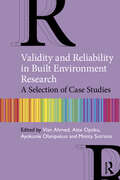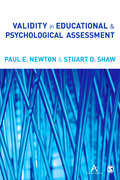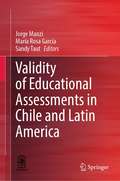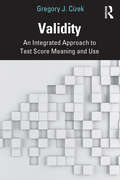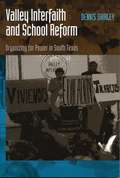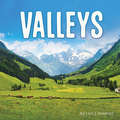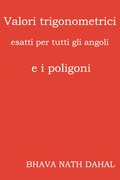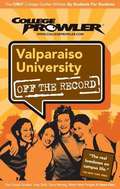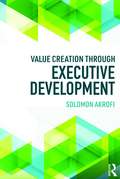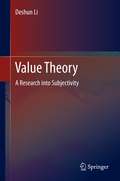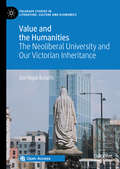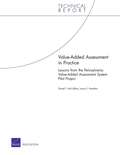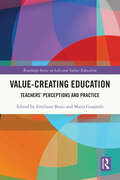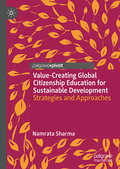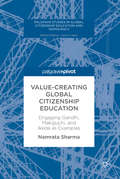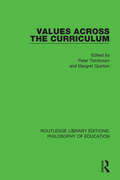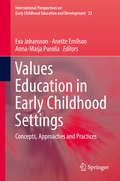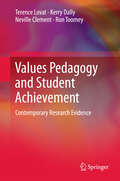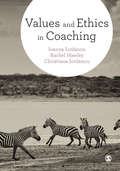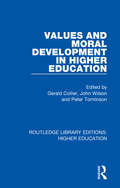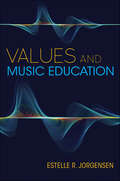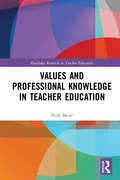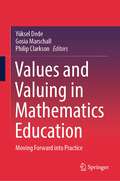- Table View
- List View
Validity and Reliability in Built Environment Research: A Selection of Case Studies
by Vian AhmedThis book aims to guide researchers who are engaged in social science and built environment research through the process of testing the reliability and validity of their research outputs following the application of different methods of data collection. The book presents case studies that emphasize reliability and validity in different examples of qualitative, quantitative and mixed method data sets, as well as covering action research and grounded theory. The reader is guided through case studies that demonstrate: An understanding of the reliability and validity approaches from social science and built environment perspectives in alignment with the relevant research philosophies, approaches and data collection strategies Real research projects that have been conducted by expert researchers on topics such as Lean, BIM, Housing and Sustainability to answer specific or evolving questions in relation to the reliability and validity of research A simple and easy method that students at Masters and PhD levels can relate to in order to adopt a sound reliability and validity approach to their research This book is the essential guide for researchers at undergraduate and postgraduate level who need to understand how to validate the quality of the empirical tests they conduct using different techniques. The book will also be a great asset to supervisors from different backgrounds who need a refresher on this key aspect of the research cycle.
Validity in Educational and Psychological Assessment
by Stuart D Shaw Paul E NewtonLecturers, request your electronic inspection copy to review it for your course. Validity is the hallmark of quality for educational and psychological measurement. But what does quality mean in this context? And to what, exactly, does the concept of validity apply? These apparently innocuous questions parachute the unwary inquirer into a minefield of tricky ideas. This book guides you through this minefield, investigating how the concept of validity has evolved from the nineteenth century to the present day. Communicating complicated concepts straightforwardly, the authors answer questions like: What does 'validity' mean? What does it mean to 'validate'? How many different kinds of validity are there? When does validation begin and end? Is reliability a part of validity, or distinct from it? This book will be of interest to anyone with a professional or academic interest in evaluating the quality of educational or psychological assessments, measurements and diagnoses.
Validity in Educational and Psychological Assessment
by Stuart D Shaw Paul E NewtonValidity is the hallmark of quality for educational and psychological measurement. But what does quality mean in this context? And to what, exactly, does the concept of validity apply? These apparently innocuous questions parachute the unwary inquirer into a minefield of tricky ideas. This book guides you through this minefield, investigating how the concept of validity has evolved from the nineteenth century to the present day.<P><P> Communicating complicated concepts straightforwardly, the authors answer questions like: <P> * What does 'validity' mean?<P> * What does it mean to 'validate'?<P> * How many different kinds of validity are there?<P> * When does validation begin and end?<P> * Is reliability a part of validity, or distinct from it?<P> This book will be of interest to anyone with a professional or academic interest in evaluating the quality of educational or psychological assessments, measurements and diagnoses.
Validity of Educational Assessments in Chile and Latin America
by Jorge Manzi María Rosa García Sandy TautThis edited volume presents a systematic analysis of conceptual, methodological and applied aspects related to the validation of educational tests used in Latin American countries. Inspired by international standards on educational measurement and evaluation, this book illustrates efforts that have been made in several countries to validate different types of educational assessments, including student learning assessments, measurements of non-cognitive aspects in students, teacher evaluations, and tests for certification and selection. It gathers the experience of validity studies from the main international assessments in Latin America (PISA, TIMSS, ERCE, and ICCS). Additionally, it shows the challenges that must be taken into account when evaluations are used to compare countries, groups or trends of achievement over time. The book builds on the premise that measurements in the educational field should not be used if there are no studies that support the validity of the interpretation of their scores, or the use made of such tests. It shows that, despite the recognition given to validity, relatively few educational measurement assessments have accumulated enough evidence to support their interpretation and use. In doing so, this volume increases awareness about the relevance of validity, especially when assessments are key component of educational policies.
Validity: An Integrated Approach to Test Score Meaning and Use
by Gregory J. CizekValidity is a clear, substantive introduction to the two most fundamental aspects of defensible testing practice: understanding test score meaning and justifying test score use. Driven by evidence-based and consensus-grounded measurement theory, principles, and terminology, this book addresses the most common questions of applied validation, the quality of test information, and the usefulness of test results. Concise yet comprehensive, this volume’s integrated framework is ideal for graduate courses on assessment, testing, psychometrics, and research methods as well as for credentialing organizations, licensure and certification entities, education agencies, and test publishers.
Valley Interfaith and School Reform: Organizing for Power in South Texas
by Dennis ShirleyCan public schools still educate America's children, particularly in poor and working class communities? Many advocates of school reform have called for dismantling public education in favor of market-based models of reform such as privatization and vouchers. <P>By contrast, this pathfinding book explores how community organizing and activism in support of public schools in one of America's most economically disadvantaged regions, the Rio Grande Valley of South Texas, has engendered impressive academic results. <P><P> Dennis Shirley focuses the book around case studies of three schools that have benefited from the reform efforts of a community group called Valley Interfaith, which works to develop community leadership and boost academic achievement. He follows the remarkable efforts of teachers, parents, school administrators, clergy, and community activists to take charge of their schools and their communities and describes the effects of these efforts on students' school performance and testing results.
Valleys (Earth's Landforms)
by Lisa J. AmstutzAll valleys are long, low cuts in the earth, but there is more to these landforms than meets the eye! While rivers form most, glaciers and splits in the Earth's crust can form others. Some are at the bottom of the sea! Give beginning readers all the need-to-know information about valleys, including their characteristics, how they form, and where they can be found around the world.
Valori trigonometrici esatti per tutti gli angoli e i poligoni
by F. Rossi Bhava Nath DahalValori trigonometrici esatti per tutti gli angoli interi e i poligoni. I valori esatti sono basati solo sulla radice di 2. Il metodo, denominato Precise - Rewritten, è nuovo rispetto al metodo classico della trigonometria.
Valparaiso University (College Prowler)
by Matthew StevensNo university affiliations. No half-truths. No out-of-touch authors who haven't been in school for decades. A class project turned company, College Prowler produces guidebooks that are written by actual college students and cover the things students really want to know. Unlike other guides that jam everything into a five-pound book and devote only two pages to each college, our single-school guidebooks give students only the schools they want and all the information they need. From academics and diversity to nightlife and sports, we let the students tell it how it is. In addition to editorial reviews and grades for 20 different topics, more than 80 percent of each guide is composed of actual student reviews of their school. Whether readers are looking for "Best and Worst" lists, "Did You Knows?" or traditions, College Prowler guides have it all. Our books are the only place for local slang, urban legends, and tips on the best places to find a date, study, or grab a bite to eat.
Value Creation through Executive Development
by Solomon AkrofiThe ability of organisations to generate long-term value and growth depends to a very large extent on the capacity of the executive cohort to conceive and implement strategic initiatives through a well-motivated and enabled workforce. However, generating consistent value in today’s volatile, uncertain, complex and ambiguous (VUCA) and rapidly evolving digital economic landscape can be challenging and, therefore, executives need to update their capabilities regularly to align with the changing value drivers required for long-term growth. To achieve the expected value and growth at a more sustainable level, executive development must be managed as a strategic asset and optimised through effective design and implementation and the effects must be proactively evaluated through meaningful leading indicators and actual 'hard' measures. Value Creation through Executive Development, therefore, offers a well-supported and clearly structured approach to address the gap between executive development initiatives and the creation of long-term organisational value and growth. This book provides a valuable resource to executives and management development professionals who have experienced frustration about the lack of non-value-adding executive development programmes. It also serves as a professional resource for managers of executive and management development programmes, organisational development departments and organisational development consultants, allowing them to integrate this material into existing programmes to achieve value-centric outcomes and to achieve long-term performance targets. Additionally, it serves as a teaching resource for participants in executive/management development courses or seminars globally; offering them the capacity to conduct value-centric initiatives and gain the capacity to influence the tactical, operational and strategic dimensions of their organisational performance.
Value Theory: A Research into Subjectivity
by Deshun LiHumankind's progress has always been driven by two momentums: the pursuit of truth and the creation of value. But our understanding of value, and our ability to reflect on its complexity, has long lagged behind our constant search for truth. This has, in turn limited our grasp of the essence of truth. This book takes philosophical contemplations on value to a new level, while also explicating some contemporary Chinese styles of philosophical thought. Over the past 25 years, this book has been having an increasing impact on Chinese readers and researchers, and it also provides a good platform for international dialogue on several key issues of philosophical studies.
Value and the Humanities: The Neoliberal University and Our Victorian Inheritance (Palgrave Studies in Literature, Culture and Economics)
by Zoe Hope BulaitisTracing the shift from liberal to neoliberal education from the nineteenth century to the present day, this open access book provides a rich and previously underdeveloped narrative of value in higher education in England. Value and the Humanities draws upon historical, financial, and critical debates concerning educational and cultural policy. Rather than writing a singular defence of the humanities against economic rationalism, Zoe Hope Bulaitis constructs a nuanced map of the intersections of value in the humanities, encompassing an exploration of policy engagement, scientific discourses, fictional representation, and the humanities in public life. The book articulates a kaleidoscopic range of humanities practices which demonstrate that although recent policy encourages higher education to be entirely motivated by outcomes, fiscal targets, and the acquisition of employability skills, the humanities continue to inspire and aspire beyond these limits. This book is a historically-grounded and theoretically-informed analysis of the value of the humanities within the context of the market.
Value-Added Assessment in Practice
by Laura S. Hamilton Daniel F. MccaffreyValue-added assessment (VAA) systems use statistical techniques to analyze test-score data; VAA data is intended to help educators make more informed decisions about curriculum and instruction. The authors examined the rollout of Pennsylvania's VAA program, and found that, in its pilot phase, the program had little effect on student achievement and received limited use by most principals and teachers at schools participating in the program.
Value-Creating Education: Teachers’ Perceptions and Practice (Routledge Series on Life and Values Education)
by Emiliano Bosio Maria GuajardoOffering a pivotal reference point and a wide range of global perspectives of teaching experiences on value-creating education (VCE), this book is a timely spotlight on contemporary issues of globalisation that many educational institutions around the world may encounter. It contributes to the originality of constructing new knowledge in the field of VCE, a forward-looking framework, and an ethical and educational imperative that can be understood in different ways, from diverse theoretical orientations. The chapters written by experienced international educators explore the following questions: How do educators understand the role of VCE? What pedagogical approaches to VCE do educators employ in their classes? How do educators support the values and knowledge of VCE in all curricular areas? What do educators see as the key essential values and knowledge that students should develop through VCE? It offers valuable insights and applied pedagogical practices for postgraduate students, researchers, educational policy makers, curriculum developers, and decision-makers in higher education institutions and non-governmental organizations (e.g., UNESCO, OXFAM).
Value-Creating Global Citizenship Education for Sustainable Development: Strategies and Approaches (Palgrave Studies in Global Citizenship Education and Democracy)
by Namrata SharmaThis volume brings together marginalized perspectives and communities into the mainstream discourse on education for sustainable development and global citizenship. Building on her earlier work, Sharma uses non-western perspectives to challenge dominant agendas and the underlying Western worldview in the UNESCO led discourse on global citizenship education. Chapters develop the theoretical framework around the three domains of learning within the global citizenship education conceptual dimensions of UNESCO--the cognitive, socio-emotional, and behavioral--and offer practical insights for educators. Value-creating global citizenship education is offered as a pedagogical approach to education for sustainable development and global citizenship in addition to and complementing other approaches mentioned within the recent UNESCO guidelines.
Value-Creating Global Citizenship Education: Engaging Gandhi, Makiguchi, And Ikeda As Examples (Palgrave Studies In Global Citizenship Education And Democracy Ser.)
by Namrata SharmaThis book fills an existing gap within the practice of global citizenship education by offering Asian perspectives. In this book, Soka or value-creating education developed by the Japanese educators, Tsunesaburo Makiguchi (1871-1944) and Daisaku Ikeda (b. 1928) is compared to the ideas of the Indian political leader Mahatma Gandhi (1869-1948). This study of their respective thoughts and movements has a significant bearing on the three domains of learning within the global citizenship education conceptual dimensions of UNESCO – the cognitive, socio-emotional, and behavioral. This book deftly combines theoretical discussions with themes and suggestions for practice and future research.
Values Across the Curriculum (Routledge Library Editions: Philosophy Of Education Ser. #18)
by Peter Tomlinson; Margret QuintonThe background to this book, first published in 1986, and its underlying concern lies with those aspects of education which relate to values. Amongst these, moral and social values are often thought of as central, and they are the title’s primary concerns. The study also deals with the value aspects and implications of the major areas of the sec
Values Education in Early Childhood Settings: Concepts, Approaches And Practices (International Perspectives on Early Childhood Education and Development #23)
by Eva Johansson Anette Emilson Anna-Maija PuroilaThis book is about values education in early years settings and discusses theory and concepts, as well as methodological and empirical perspectives. It explores issues such as the kinds of values that are communicated between educators and children and the kind of future citizens we foster in early childhood settings. It illustrates by way of cases involving many participants, including children, educators, and researchers, who have their roots in diverse contexts, and reside in different parts of the world, including Australia, Denmark, Finland, Iceland, Norway, Slovenia, and Sweden. The book carefully considers the contextualized character of the cases presented, yet argues that the questions, theories, and methodologies emphasized do inform the international debate in manifold ways. Communication of values in a broad and diverse sense is central in any pedagogy, especially for the youngest children in the educational system. Still, values education has been neglected as a research field, in education in general and particularly in the early years. This book addresses this lack of knowledge by scrutinizing various questions about values education in ECEC settings.
Values Pedagogy and Student Achievement
by Terence Lovat Kerry Dally Neville Clement Ron ToomeyUnder the weight of a combination of forces, many of the older paradigms of learning are being questioned in our time. Among the updated research that elicits such critique is that which deals directly with effective pedagogy, clearly illustrating the enhanced effects on learning when it is dealt with as a holistic developmental enterprise rather than one concerned solely with content, technique and measurable outcomes. This research includes volumes of empirical evidence and conceptual analysis from across the globe that point to the inextricability of values as lying at the heart of those forms of good practice pedagogy that support and facilitate the species of student achievement that truly does transform the life chances of students. This research indicates that the combination of values rich learning environments and values discourse (that is, the holism of implicit and explicit pedagogy) has potential for positive influence on learning outcomes, most markedly for those deemed likely to fail without such pedagogical intervention. Values Pedagogy and Student Achievement - Contemporary Research Evidence uncovers, explores and appraises those volumes of evidence and analysis, illustrating their pertinence to student achievement, the vexed issue that lies at the heart of all for which education stands.
Values and Ethics in Coaching
by Christiana Iordanou Ioanna Iordanou Rachel HawleyThe first complete guide to exploring values and ethics in coaching, this book will guide you through the responsibilities of coaching practice, and help you recognize and reconcile common ethical dilemmas and choices. Part I explores the theory and research underpinning ethical coaching practice, and invites you to examine own personal and professional values. Part II delves into the key ethical considerations in the coaching relationship, including contracting, confidentiality and understanding boundaries. It explores each issue in depth, and offers implications and suggestions for practice. Part III examines individual professional contexts, including coaching in business, sports and healthcare with real life examples and reflections from practising coaches. This book is vital reading for trainee and practitioner coaches, and those looking to introduce ethical coaching practice into a professional setting.
Values and Ethics in Coaching
by Christiana Iordanou Ioanna Iordanou Rachel HawleyThe first complete guide to exploring values and ethics in coaching, this book will guide you through the responsibilities of coaching practice, and help you recognize and reconcile common ethical dilemmas and choices. Part I explores the theory and research underpinning ethical coaching practice, and invites you to examine own personal and professional values. Part II delves into the key ethical considerations in the coaching relationship, including contracting, confidentiality and understanding boundaries. It explores each issue in depth, and offers implications and suggestions for practice. Part III examines individual professional contexts, including coaching in business, sports and healthcare with real life examples and reflections from practising coaches. This book is vital reading for trainee and practitioner coaches, and those looking to introduce ethical coaching practice into a professional setting.
Values and Moral Development in Higher Education (Routledge Library Editions: Higher Education #4)
by Gerald Collier, Peter Tomlinson and John WilsonOriginally published in 1974 Values and Moral Development in Higher Education deals practically with various aspects of the impact of higher educational processes, recognising a need for these to be inter-related and understood within a common framework. It takes the form of a set of contributions whose authors have sought to relate their perspectives and experiences by reference to John Wilson’s philosophical analyses of the nature of moral maturity and the possible aims of moral education, and, where possible, to each other.
Values and Music Education (Counterpoints: Music and Education)
by Estelle R. JorgensenWhat values should form the foundation of music education? And once we decide on those values, how do we ensure we are acting on them?In Values and Music Education, esteemed author Estelle R. Jorgensen explores how values apply to the practice of music education. We may declare values, but they can be hard to see in action. Jorgensen examines nine quartets of related values and offers readers a roadmap for thinking constructively and critically about the values they hold. In doing so, she takes a broad view of both music and education while drawing on a wide sweep of multidisciplinary literature. Not only does Jorgensen demonstrate an analytical and dialectical philosophical approach to examining values, but she also seeks to show how theoretical and practical issues are interconnected.An important addition to the field of music education, Values and Music Education highlights values that have been forgotten or marginalized, underscores those that seem perennial, and illustrates how values can be double-edged swords.
Values and Professional Knowledge in Teacher Education (Routledge Research in Teacher Education)
by Nick MeadValues and Professional Knowledge in Teacher Education provides distinctive insights into potential strengths to develop trainee teachers’ values within school-based training. Looking at the personal moral and political values of trainees as fundamental to strategic and critical professional knowledge, the book considers a key question about training contexts: to what extent is teacher education embedded in the purpose and rationale of the school so that trainees’ values, and consequently their autonomy and identity, can flourish? The book is research focused and offers case studies that offer vicarious experiences which resonate with the professional needs and concerns of teacher educators. The book opens with a reflective narrative on the experience of a teacher educator in England. Further chapters explore international perspectives on values and professional knowledge in teacher education, applied theoretical principles for developing the relationship between trainee teachers’ values and their professional knowledge, the impact of university and school-based training contexts on the development of values-based professional knowledge, and the challenge of a values-based professional knowledge to current teacher education practice. Values and Professional Knowledge in Teacher Education will be of great interest to academics and post-graduate students in the field of education, university and school-based teacher educators, trainee teachers, researchers, policymakers and school leaders.
Values and Valuing in Mathematics Education: Moving Forward into Practice
by Philip Clarkson Yüksel Dede Gosia MarschallThis book is a follow-up to 'Values and Valuing in Mathematics Education: Scanning and Scoping the Territory' (2019, Springer). This book adds a critical emphasis on practice and fosters thinking concerning positive mathematical well-being, engagement, teacher noticing, and values alignment among a range of critical notions that intersect with values and valuing. Values and valuing play a key role in many aspects of education, such as assessment, planning, classroom interactions, choosing tasks, and general well-being. What one values and finds important in the learning and teaching of mathematics operates within the intersection of all social, cognitive, and affective aspects of school pedagogy, making values a significant holistic factor in education. The chapters explore potential teaching strategies that enhance the understanding of the central place of values in mathematics itself as a subject, as well as how values impact how mathematics is used withinsociety. This book includes examples of strategies for facilitating students’ meaningful engagement with, and conscious learning of, values when engaging in mathematical thinking and doing.
